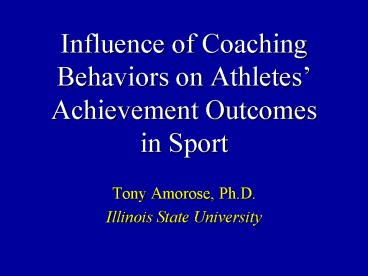Influence of Coaching Behaviors on Athletes PowerPoint PPT Presentation
1 / 46
Title: Influence of Coaching Behaviors on Athletes
1
Influence of Coaching Behaviors on Athletes
Achievement Outcomes in Sport
- Tony Amorose, Ph.D.
- Illinois State University
2
Effective vs. Ineffective Coaching/Leadership
- What are the outcomes associated with effective
leaders/coaches? - How do we evaluate whether a coach or leader is
effective or ineffective?
3
Outcomes Associated with Effective
Coaches/Leaders
4
5
Questions?
- Who are these coaches/leaders?
- What attributes do these effective
coaches/leaders posses? - What types of behavior do these effective
coaches/leaders exhibit? - How do they differ from ineffective
coaches/leaders?
6
Effective Coaches Effective Coaches Ineffective Coaches Ineffective Coaches
attributes behavior attributes behavior
7
Questions?
- Are there occasions or situations where these
"effective" attributes and behaviors are actually
"ineffective"? - If so, when and under what conditions?
8
Horns (2002) Model of Coaching Effectiveness
- integrates other coaching/leadership models
- Multidimensional Model of Leadership
- Mediational Model of Leadership
- helps organize research on coaching behavior
9
Examples of Research on Coaching
- feedback and reinforcement
- general leadership styles
- expectation effects
10
Principles of Reinforcement and Performance
Feedback
- Behavioral Coaching
- Basic Premise
11
if positive consequence ?
if negative consequence ?
consequences of behavior involve either the
presentation, the nonoccurrence, or the removal
of a positive or aversive stimulus
12
present remove
positive stimuli
aversive stimuli
13
Positive vs. Aversive Control
- positive approach (i.e., positive control)
negative approach (i.e., aversive control)
14
Important Point
- The negative approach is a very successful at
modifying behavior!
However, there are undesirable consequences of
this approach
15
Keys to Effective Behavioral Coaching Using the
Positive Approach
- 1. identify the desired behaviors
16
- 2. monitor and reinforce the desired behaviors
17
- 3. evaluate the effectiveness of the behavior
modification program
18
Coaching Effectiveness Training Studies
- research by Smith, Smoll, and colleagues
- based on the Mediational Model of Leadership
Phase 1 development of the Coaching Behavior
Assessment System (CBAS) through systematic
observation of youth sport coaches
19
Phase II
- Are specific coaching behaviors are related to
the athletes sport experiences?
- Basic Results
- Behaviors positively related to post-season
evaluations - Behaviors negatively related to post-season
evaluations
20
- Findings used to develop a series of coaching
guidelines labeled the Positive Approach to
coaching
- General Guidelines
21
Philosophy of Positive Approach
- 1. Winning isnt everything, nor is it the only
thing.
2. Failure is not the same thing as losing.
22
- 3. Success is not equivalent to winning.
4. Athletes should be taught that success is
found in striving for victory (i.e., success is
related to commitment and effort).
23
Phase III
- Used the guidelines of the Positive Approach to
train coaches
- Summary of Results
- Athletes from trained coaches
24
Important Point
- using the positive approach guidelines generally
results in positive outcomes - However
- it is not enough to just provide high frequencies
of these coaching behaviors - effective feedback must also be given
25
- Contingent
Appropriate
26
Why?
- non-contingent and inappropriate feedback have
been shown to have negative consequences for
athletes
27
Horn (1985)
28
Explanation of Results
29
Key Point
- It is not necessarily the quantity of feedback
that is important, rather the quality of the
feedback!
30
Guidelines for Effective Feedback
31
32
General Leadership Styles
- Price and Weiss (2000)
- Research Questions
- Do coaches who vary in burnout differ in the
behaviors athletes perceive they exhibit? - Are coaching behaviors related to athletes
psychological responses?
33
Burnout
- What are possible signs or symptoms of burnout?
- Burnout Defined
34
Results
- coaches burnout and behavior
- coaching behaviors and athletes psychological
responses
35
How Can We Reduce Burnout?
- 1. suggestions by athletes
- 2. other suggestions
36
37
Expectation Effects
- expectations that a coach forms about the
abilities of an athlete can serve as prophecies
that dictate or determine the level of
achievement that athlete will ultimately reach - Important Points
38
Step 1
- coach form expectations
Person Cues
Performance Cues
- Important Points
39
Step 2
- coachs expectations affect his/her behavior
Differential treatment of athlete include 1.
the frequency and quality of the coach-athlete
interactions
40
- 2. the quantity and quality of instruction
41
3. the type and frequency of verbal feedback
42
Important Points
43
Step 3
- coachs behavior affects the athletes
performance, behavior, and psychological
responses
Step 4
athletes performance conforms to the coachs
expectation
44
Important Point
45
Conclusions
- Coaches should
46
Take home Message
- coaches can have a significant impact on
athletes behaviors, cognitions, and affective
responses - effective coaching behaviors will depend on
personal and situational factors, but should be
pursued at all costs!

